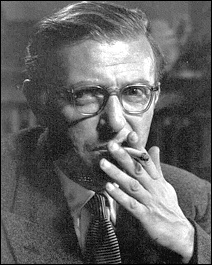French existentialist philosopher Jean-Paul Sartre saw freedom, not just as a state of being or of mind, but as something with a distinct psychological or philosophical purpose. In his existential classic, Being and Nothingness, he writes, “Freedom is the way human beings put their past out of play by secreting their own nothingness.”

Sartre had an exaggerated need for freedom, which may have come from his experiences in Nazi-occupied France. (Photo: WPClipart)
Sartre proposed that “nothing” is both the ground of human existence and what makes human existence possible. Unfortunately, this strange reality also generates an anxiety so unbearable that we all yearn to fill the nothing with something. From the psychological perspective, arbitrarily filling the nothing with something is an attempt to falsify ourselves and become what we are not. The something with which we choose (using our freedom) to replace the nothing is the foundation of our personal inauthenticity. In other words, there is nothing within us so we must “fill the vacuum,” so to speak, with an artificially constructed sense of self. Sartre’s motive for taking this unusual line is his desire to eliminate the old notion of dualism and replace it with a new monistic vision. To eliminate the perceived inside versus outside duality of the human being, he had to propose a situation where there was but one thing.
Nevertheless, “nothing” as a concept applied to the human psyche is sheer nonsense. (Sartre’s notion is akin to saying that silence – the absence of any sound – makes sound possible when, in fact, the presence of the substance we call air enables us to hear.) We humans are not secreting an authentic nothing, and then longing to fill the vacuum with an inauthentic something. We are, in fact, secreting an authentic something (the true self), and then craving to replace it with an inauthentic something else (the idealized false persona). That is, for myopic reasons of imagined personal gain we repress who we really are so we can pretend to be someone better, finer, and more impressive. Having both an authentic self and a false persona does not constitute dualism because the false persona is not real. This is precisely Sartre’s argument for why his “something” does not create a duality.
Sartre had an exaggerated need for freedom, which some have claimed arose from his experiences in Nazi-occupied France. This need extended even into psychology where he sought to make his conscious decision-making mind the unchallenged king. Only if this were true could he be genuinely free. He would accept nothing less. Freud and Jung threatened his precious freedom with their disturbing concept of the subconscious or unconscious mind. Freud posited neurosis. Jung was especially troubling with his claim that the unconscious mind could erupt and completely swamp the conscious ego.
Sartre wanted desperately to legitimize his idea that inauthenticity replaced “nothing.” By doing so, he would never have to deal with an unconscious mind, the existence of which he vehemently denied. If there is “nothing” within, then you do not have to acknowledge it in any substantive way. You do not have to deal with it. Again, if there is nothing within, then you are quite right in pretending to be anyone or anything you please. You will be no worse than those others who must also play the game to fill their own nothing. This “unavoidable” inauthenticity is what Sartre regarded as freedom.
In reality, we pay a dreadful price for playing the inauthenticity game. Continually propping up an inaccurate false persona is hard work. False persona building, and the repression required to keep the false self in business, constitute self-alienation. It is a question of degree. The more inauthentic we are, the more we become alienated from our authentic selves. Soon, the repression needed to keep unwanted character traits, ideas, and thoughts out of conscious awareness creates disquieting unconscious pressures.
Sartre was (perhaps) unique in his reasons for denying his authentic self. For most of us, self-dislike or even self-hate is the motivation for denying the existence of the genuine self. We consciously decide that we dislike who we really are and then try to be someone else. We try to adopt behaviour not our own, pretend to hold idealistic values borrowed from books, movies, television shows, or ideologies; or embark upon self-improvement programs designed to change things about ourselves that are actually unalterable. Since this new version of us is not real, exposure is a constant dreaded danger. Such an agonizingly precarious situation, living with the threat of being revealed a phony (loss of face), is the real source of Sartre’s famous unendurable anxiety, the condition we call existential angst.
The “freedom” Sartre championed foolishly sets the conscious ego against the largely-unconscious authentic self. Being free to be a partial, or even a complete, phoney is not real freedom. True freedom is something far greater than this. It is the freedom to be authentic, to be who you really are.
Related articles
- Religious Conversion Can Block Self-Discovery (thomascotterill.wordpress.com)
- The Unconscious Mind Is the Human Quintessence (thomascotterill.wordpress.com)
- Understanding Your Creativity (thomascotterill.wordpress.com)
It’s many a long year since I attempted to read any Sartre and I always found his strange, complicated and dismal philosophy fairly incomprehensible. I was delighted to have it summarised.
Thanks, Lucinda. I agree with you that Sartre’s philosophy is complicated and dismal, but I share his belief that our acts define us and that we must take responsibility for what we do.